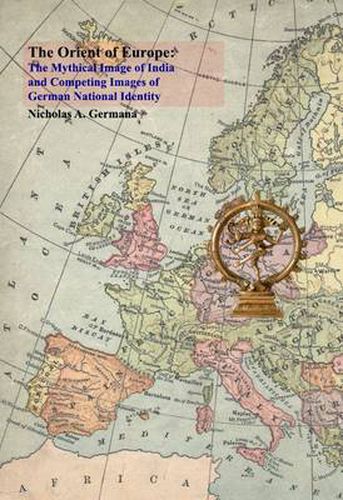Readings Newsletter
Become a Readings Member to make your shopping experience even easier.
Sign in or sign up for free!
You’re not far away from qualifying for FREE standard shipping within Australia
You’ve qualified for FREE standard shipping within Australia
The cart is loading…






August Wilhelm Schlegel proclaimed that [i]f the regeneration of the human species started in the East, Germany must be considered the Orient of Europe. How can this remarkable identification of Germany with the subjugated oriental ‘other’ be explained? In The Orient of Europe, Nicholas A. Germana explores how German thinkers, especially those associated with the Early Romantic movement, set India up as an ideal mirror, in which they could perceive the image of the Germany they longed for - a nation whose greatness lay not in political and military power, but in the realm of culture and the spirit. Such an image was especially important during the years of French occupation and the Wars of Liberation against Napoleon.
The ‘mythical image’ of India, however, underwent profound changes in the decades after 1815. The end of the Wars of Liberation and the onset of the Restoration era, led to the decline of the romantic image of India. As statist visions of German unity rose in prominence, especially in Prussia, this image of the connection between Germany and ancient India took on a new complexion. Politically volatile romantic Indomania gave way to a new, more acceptable, ideology - the ideology of Wissenschaft. In this book, which engages with the most recent scholarship in the rapidly emerging field of German Orientalism, Germana challenges traditional Saidian Orientalist readings of German intellectual engagement with Indian thought and literature. German romantic and humanist fascination with India, he argues, is best understood within the context of debates about the nature of ‘Germany’ and ‘Germanness’ in the late eighteenth and early nineteenth centuries, rather than in connection with nascent German colonial fantasies.
$9.00 standard shipping within Australia
FREE standard shipping within Australia for orders over $100.00
Express & International shipping calculated at checkout
August Wilhelm Schlegel proclaimed that [i]f the regeneration of the human species started in the East, Germany must be considered the Orient of Europe. How can this remarkable identification of Germany with the subjugated oriental ‘other’ be explained? In The Orient of Europe, Nicholas A. Germana explores how German thinkers, especially those associated with the Early Romantic movement, set India up as an ideal mirror, in which they could perceive the image of the Germany they longed for - a nation whose greatness lay not in political and military power, but in the realm of culture and the spirit. Such an image was especially important during the years of French occupation and the Wars of Liberation against Napoleon.
The ‘mythical image’ of India, however, underwent profound changes in the decades after 1815. The end of the Wars of Liberation and the onset of the Restoration era, led to the decline of the romantic image of India. As statist visions of German unity rose in prominence, especially in Prussia, this image of the connection between Germany and ancient India took on a new complexion. Politically volatile romantic Indomania gave way to a new, more acceptable, ideology - the ideology of Wissenschaft. In this book, which engages with the most recent scholarship in the rapidly emerging field of German Orientalism, Germana challenges traditional Saidian Orientalist readings of German intellectual engagement with Indian thought and literature. German romantic and humanist fascination with India, he argues, is best understood within the context of debates about the nature of ‘Germany’ and ‘Germanness’ in the late eighteenth and early nineteenth centuries, rather than in connection with nascent German colonial fantasies.